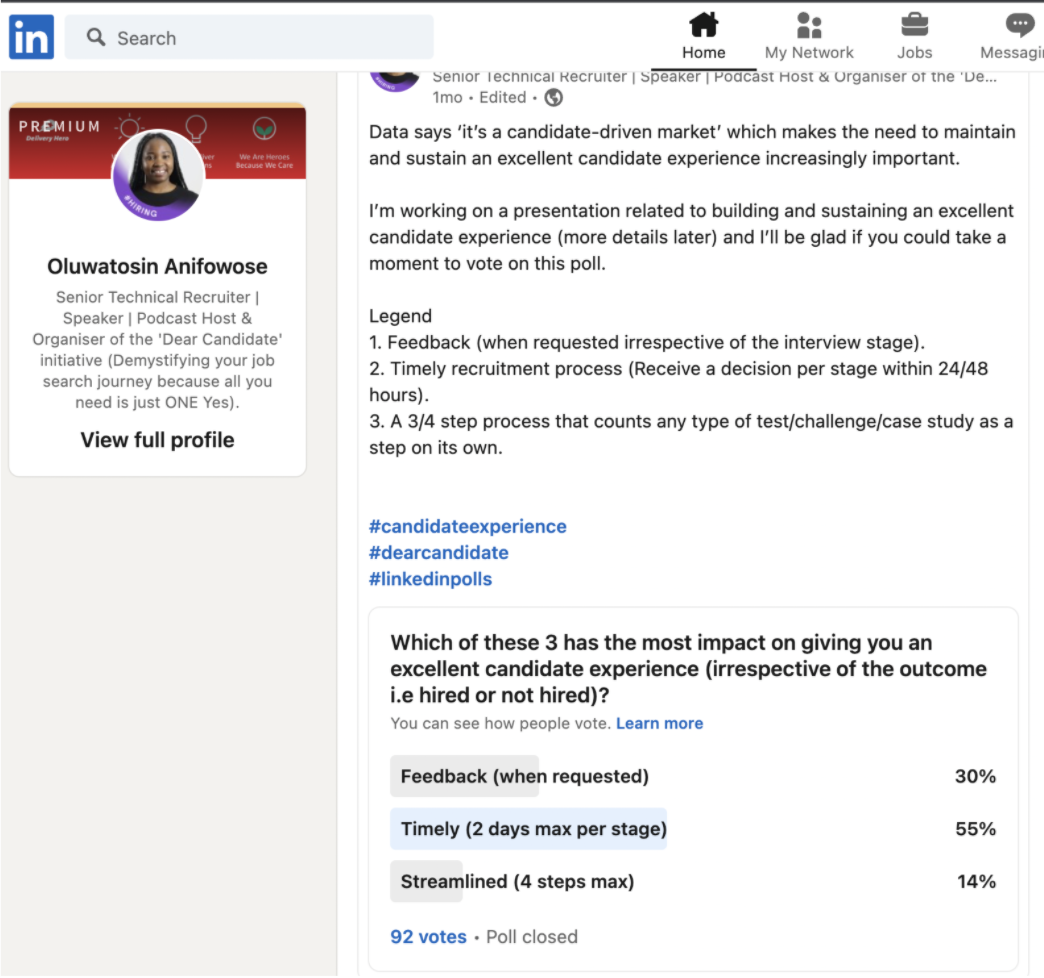A personal story
A couple of years back during my Job search phase, I recall attending an onsite interview with a Berlin-based company. For a company of that size, everything looked pretty standard and organized. After the onsite interview, I was asked to expect a response within 2 days. I was excited, all I had to do was wait for 2 days. Sadly, 2 days became 3 and eventually 1 week. After refreshing my email for the 100th time (figuratively speaking now), I decided to send a polite check-in email to the company to find out if they had any news for me. In my anxiety, I ensured that I copied everyone that I had spoken to in the company up until that time so that I would at least get a response from one of them.
Guess what, it worked. Someone from the HR department reached out to me, and she told me that the team was currently on an offsite and as such, I should expect a response within the week. I was disappointed but who am I? Just another candidate on paper so of course I responded nicely and I resumed my vigil. The said week came and it went by and still ‘radio silence’.
I reached out again but this time around I poured out how I felt on paper. I expressed my disappointment at the lack of transparency with the process and the fact that I had to follow up multiple times before getting any updates. I went on to explain how excited I was to attend the onsite interview that day, detailing how I arrived at the venue in the cold winter hours before the interview was to start because I did not want to get there late and so on. I concluded by telling them I was not pleased with the candidate experience and as feedback advised that they look into improving this for future candidates.
Well, I got a response and for lack of a better word, it was like a letter ‘Bomb’ or let’s say an ‘Email Bomb’. The Head of talent acquisition or human resources had received my email and she took it upon herself to put me in my place. She told me how candidates would travel from outside of Germany to come to their company for onsite interviews and wondered why it was such a big deal for me who lived in Germany. She went on to tell me that I was not a culture fit for their organization and as such, they would not be proceeding with my application. Of course, I did not respond, I was literally too stunned at what I just read. To avoid having to revisit it, I deleted it but that memory has stayed with me ever since.
I said all that to say this ‘ The face of a negative candidate experience is really never forgotten’.
The quote by Maya Angelou is one I like a lot and it says "People will forget what you said, people will forget what you did, but people will never forget how you make them feel".
"People will forget what you said, people will forget what you did, but people will never forget how you make them feel".
As one who now works in the talent acquisition space, I can wholeheartedly tell you that my heart is ‘candidate experience’ because I know what it means to be at the receiving end of a negative candidate experience.
Today, would I have written the email I sent to that company? Probably not, because as a recruiter I have indeed received some ‘candidate bombs’ but most times I empathise with the candidates because I understand that it is coming from a place of anger and frustration at the process. Literally, everyone in the talent acquisition space talks about candidate experience so much so that it has now become some kind of a buzzword. My question to you today is, what is an excellent candidate experience?
As an organization, how can you create, sustain and optimize an excellent candidate experience? These are difficult questions to answer but until we start to answer these questions, then perhaps maybe the need to prioritize the candidate experience is not as important as we say it is.
I have a few ideas about what this may look like but I must state that these things are not linear so basically it’s not a one size fits all principle.
What is an excellent Candidate Experience?
Let’s start by debunking the fact that defining an excellent candidate experience sits on the shoulders of everyone but the candidate(s).
I beg to differ, I believe that ‘an excellent candidate experience is really not about what I think it is, it is rather what my candidates define it to be’ which is perhaps why the definition would keep evolving with the lifetime of the organization.
Now if you accept this, it means that collecting feedback from your candidates at critical points in your process is critical. The data you collect would be instrumental in helping you create, sustain and optimize your processes. In a nutshell, an excellent candidate experience is what your candidates define it to be and you are able to feel the pulse of your candidates by leveraging data. To make this more practical, let’s take a look at some data.
Linkedin Poll
I recently carried out a poll on Linkedin (my first Linkedin poll actually) and the results of the poll are captured below. Deciding on the 3 most critical factors to settle for was indeed a herculean task because there are just so many factors to consider when trying to narrow down what has the most impact on your candidate experience.
From my interaction with candidates both on my 9/5 Job as a senior tech recruiter of a tech company where I speak to an average of 5 to 7 candidates per day and through my Dear candidate initiative where I have been able to support 30+ candidates on their job search journey, I’ve learned that feedback, a timely recruitment process and a streamlined recruitment process appear very appealing to candidates.
Therefore in my poll, I decided to ask candidates which of these 3 matters to them most. From the results, we see that 55% of the 92 participants that voted, all decided for a timely recruitment process (which is defined as a process that reveals the decision per stage within a 24 to 48 hour period).
What that tells me is that candidates expect an excellent candidate experience to be one that has a time-bound feedback loop.
On this basis, I have come up with a list of questions that can help you begin your journey towards giving your candidates an excellent experience because the whole idea of building, sustaining and optimizing an excellent candidate can appear overwhelming but the fact still remains that it can be done!
We must understand, that we are gradually getting to the point where companies with an excellent candidate experience would be the ones to attract the brightest and the best that the market has to offer because everyone wants to be associated with a brand that treats people right.

Candidate Experience Checklist
1. Setting Expectations
-
- From your career page: Do candidates have an overview of what each step in your process looks like?
- From the point of applications: Do candidates know when to expect a response after sending in their applications?
- From the point of interviews: Do candidates know when to expect feedback or a decision per interview round?
- Is it clear to candidates when they can reapply to your organization?
- Do you share tips to set up your candidates (who may become future employees) for success in your organization?
- From your career page: Do candidates have an overview of what each step in your process looks like?
2. Data collection
-
- Do you collect any kind of candidate feedback?
- What are your data collection touchpoints and why? (what are you trying to measure)?
- How often do you visit the data and action on the points or patterns observed?
- Do you have a dedicated team member(s) in charge of this topic or is it considered as one of those side projects that any and everybody should own or work on?
- Do you have a candidate experience OKR Or KPI?
- Do you collect any kind of candidate feedback?
3. Team
-
- Who is responsible for the candidate experience?
- How well does your team understand the topic and its importance?
- Are your interviewers trained? And how often?
- Do you have standardized SLA’s across your teams?
- Do your interviewers receive feedback regularly to help them improve?
- Who is responsible for the candidate experience?
To conclude
Nailing the candidate experience is perhaps like ‘reverse engineering’ in some sense. You start by de-constructing ‘the whole’ to identify the different components that all contribute towards helping you create an amazing experience for your candidates. You do this by analyzing your data and working backwards. The complexity of designing one perfect process for people from different backgrounds who have different expectations and ideas on what an excellent candidate should look like may appear impossible but we should always strive for common ground.
You liked what you read? Connect with Tosin on LinkedIn and have a look at the Dear Candidate initiative here.





